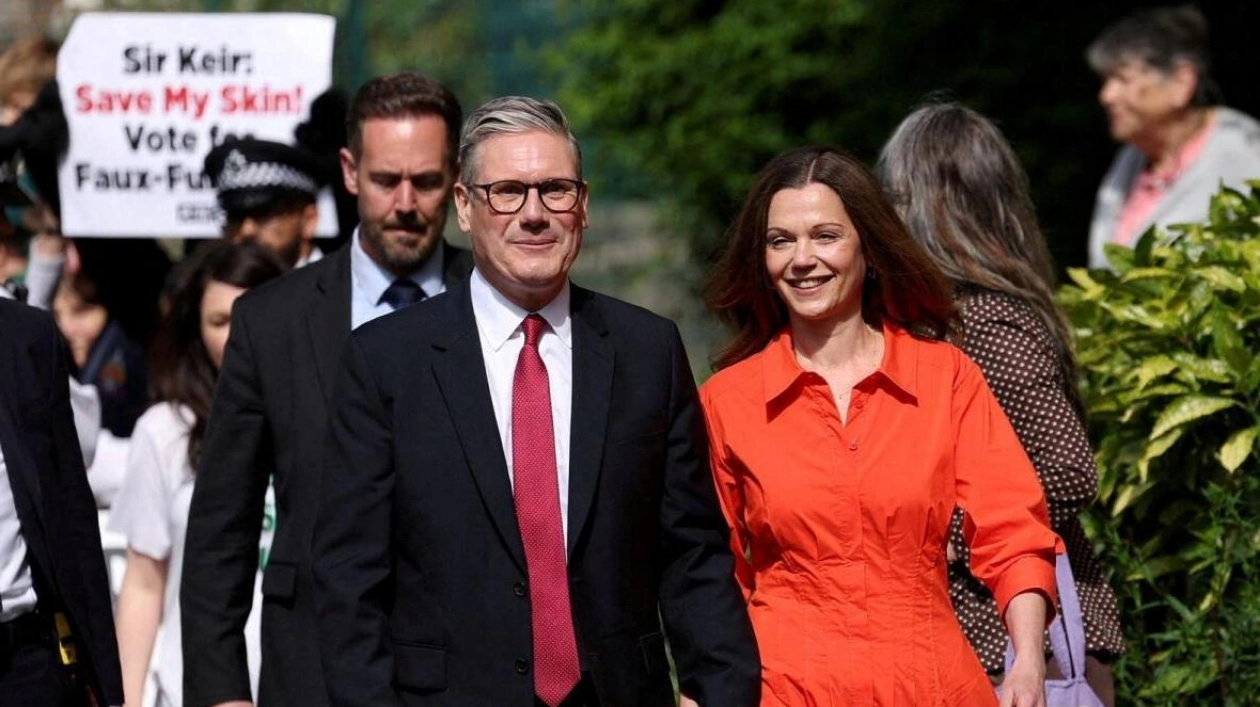Labour leader Keir Starmer, a former human rights lawyer turned state prosecutor, is known for his relentless ambition and strong work ethic, traits that seem poised to propel him to the highest political office in Britain. At 61, he bears the name of Labour's founding father, Keir Hardie, and is the most working-class leader of the centre-left opposition party in decades.
"My father was a toolmaker, my mother a nurse," Starmer frequently reminds voters, challenging the narrative that he embodies the smug, liberal elite of London. With his distinctive grey quiff and black-rimmed glasses, he remains somewhat of an enigma to many voters, who are expected to send him to Downing Street following the upcoming general election. Critics view him as an uninspiring opportunist, yet his supporters see him as a pragmatic manager, prepared to tackle the role of prime minister with the same diligence he applied to his legal career.
"Politics must be about service," Starmer declared in a recent campaign speech, reiterating his commitment to prioritise the country over the party after 14 years of Conservative leadership under five different prime ministers. Despite sometimes appearing uneasy in the public eye, Starmer, a dedicated Arsenal fan who entered politics later in life, has found it difficult to shake off his image as stiff and dull. However, those who know him personally describe him as humorous and loyal. He and his wife, Victoria, an occupational therapist with the National Health Service, have two teenage children, a daughter and a son. Starmer has promised to continue his practice of not working past 6:00 pm on Fridays to spend time with his family.
Born on September 2, 1962, Keir Rodney Starmer grew up in a modest, semi-detached house on the outskirts of London with a seriously ill mother and an emotionally distant father. He had three siblings, one with learning difficulties, and his parents were known for rescuing donkeys. "Whenever one of us left home, they replaced us with a donkey," Starmer has humorously noted. A skilled musician, he took violin lessons with Norman Cook, formerly of the Housemartins and later known as DJ Fatboy Slim, and attended a prestigious London music school on weekends.
After studying law at the universities of Leeds and Oxford, Starmer focused on leftist causes, defending trade unions, anti-McDonald's activists, and death row inmates overseas. He is friends with human rights lawyer Amal Clooney, having worked together in the same legal practice, and has shared stories of socialising with her and her husband, actor George Clooney. In 2003, Starmer began to align himself with the establishment, initially by ensuring police in Northern Ireland adhered to human rights legislation. Five years later, he was appointed director of public prosecutions for England and Wales under then-Prime Minister Gordon Brown.
During his tenure from 2008 to 2013, Starmer oversaw high-profile prosecutions, including those of MPs for expense abuse, journalists for phone hacking, and young rioters. Knighted by Queen Elizabeth, he rarely uses the title "Sir" and was elected as a member of parliament in 2015, representing a constituency in north London. Tragically, just weeks before his election, his mother passed away from a rare joint disease that had left her immobile for years. In 2021, Starmer emotionally recounted how her painful death deeply affected his father during a TV interview.
A year into his parliamentary role, Starmer opposed Jeremy Corbyn's leadership during the EU referendum, a move that ultimately failed. He later rejoined the Labour frontbench as Brexit spokesman until he succeeded Corbyn, who led the party to its worst electoral defeat since 1935. Since then, Starmer has demonstrated a ruthless streak by steering the party back to the centre and addressing issues like anti-Semitism. The left views his abandonment of certain campaign promises, such as scrapping university tuition fees, as a betrayal. However, his strategic realignment of Labour towards a path of potential power reflects a lifelong drive for success.
"If you're born without privilege, you don't have time for messing around," Starmer has said. "You don't walk around problems without fixing them, and you don't surrender to the instincts of organisations that won't face up to change."






